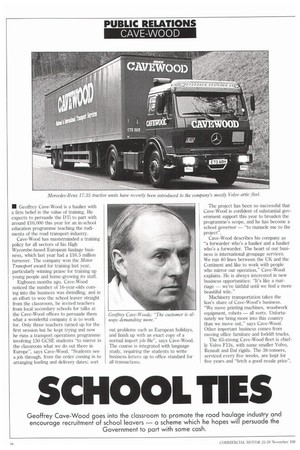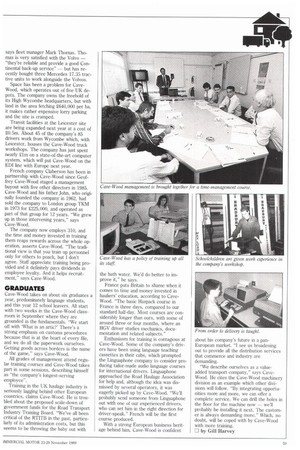MI Geoffrey Cave-Wood is a haulier with a firm belief
Page 60

Page 61

If you've noticed an error in this article please click here to report it so we can fix it.
in the value of training. He expects to persuade the llTi to part with around £10,000 this year for an in-school education programme teaching the rudiments of the road transport industry.
Cave-Wood has masterminded a training policy for all sectors of his High Wycombe-based European haulage business, which last year had a £16.5 million turnover. The company won the Motor Transport award for training last year, particularly winning praise for training up young people and home-growing its staff.
Eighteen months ago, Cave-Wood noticed the number of 16-year-olds coming into the business was dwindling, and in an effort to woo the school leaver straight from the classroom, he invited teachers from local secondary schools for talks at the Cave-Wood offices to persuade them what a wonderful company it is to work for. Only three teachers turned up for the first session but he kept trying and now he runs a transport operations programme involving 150 GCSE students "to mirror in the classroom what we do out there in Europe", says Cave-Wood. "Students see a job through, from the order coming in to arranging loading and delivery dates; sort out problems such as European holidays, and finish up with an exact copy of a normal import job file". says Cave-Wood. The course is integrated with language study, requiring the students to write business letters up to office standard for all transactions. The project has been so successful that Cave-Wood is confident of substantial government support this year to broaden the programme's scope, and he has become a school governor — "to manacle me to the project".
Cave-Wood describes his company as "a forwarder who's a haulier and a haulier who's a forwarder. The heart of our business is international groupage services. We run 40 lines between the UK and the Continent and like to work with people who mirror our operation," Cave-Wood explains. He is always interested in new business opportunities: "It's like a marriage — we're faithful until we find a more beautiful wife."
Machinery transportation takes the lion's share of Cave-Wood's business. "We move printing machines, woodwork equipment, robots — all sorts. Unfortunately we bring more into this country than we move out," says Cave-Wood. Other important business comes from moving office furniture and forklift trucks.
The 63-strong Cave-Wood fleet is chiefly Volvo F12s, with some smaller Volvo, Renault and Daf rigids. The 38-tonners, serviced every five weeks, are kept for five years and "fetch a good resale price", says fleet manager Mark Thomas. Thomas is very satisfied with the Volvo — "they're reliable and provide a good Continental back-up service" — but has recently bought three Mercedes 17.35 tractive units to work alongside the Volvos.
Space has been a problem for CaveWood, which operates out of five UK depots. The company owns the freehold of its High Wycombe headquarters, but with land in the area fetching E640,000 per ha, it makes rather expensive lorry parking and the site is cramped.
Transit facilities at the Leicester site are being expanded next year at a cost of 20.5m. About 45 of the company's 85 drivers work from Wycombe which, with Leicester, houses the Cave-Wood truck workshops. The company has just spent nearly Elm on a state-of-the-art computer system, which will put Cave-Wood on the EDI line with Europe next year.
French company Claberson has been in partnership with Cave-Wood since Geoffrey Cave-Wood staged a management buyout with five other directors in 1985. Cave-Wood and his father John, who originally founded the company in 1962, had sold the company to London group TKM in 1973 for £225,000, and operated as part of that group for 12 years. "We grew up in those intervening years," says Cave-Wood.
The company now employs 310, and the time and money invested in training them reaps rewards across the whole operation, asserts Cave-Wood. "The traditional view is that you train up personnel only for others to poach, but I don't agree. Staff appreciate training being provided and it definitely pays dividends in employee loyalty. And it helps recruitment," says Cave-Wood.
GRADUATES
Cave-Wood takes on about six graduates a year, predominately language students, and this year 12 school leavers. All start with two weeks in the Cave-Wood classroom in September where they are grounded in the fundamentals. "We start off with 'What is an artic?' There's a strong emphasis on customs procedures because that is at the heart of every file, and we do all the paperwork ourselves. Getting goods across borders is the name of the game," says Cave-Wood.
All grades of management attend regular training courses and Cave-Wood takes part in some sessions, describing himself as "the company's longest-serving employee".
Training in the UK haulage industry is seriously lagging behind other European countries, claims Cave-Wood. He is troubled about the proposed scale-down of government funds for the Road Transport Industry Training Board. "We've all been critical of the RT1TB in the past, particularly of its administration costs, but this seems to be throwing the baby out with the bath water. We'd do better to improve it," he says.
France puts Britain to shame when it comes to time and money invested in hauliers' education, according to CaveWood. "The basic Hazpack course in France is three days, compared to our standard half-day. Most courses are considerably longer than ours, with some of around three or four months, where an HGV driver studies mechanics, documentation and related subjects."
Enthusiasm for training is contagious at Cave-Wood. Some of the company's drivers have been using language teaching cassettes in their cabs, which prompted the Linguaphone company to consider producing tailor-made audio language courses for international drivers. Linguaphone approached the Road Haulage Association for help and, although the idea was dismissed by several operators, it was eagerly picked up by Cave-Wood. "We'll probably send someone from Linguaphone out with one of our experienced drivers, who can set him in the right direction for driver-speak." French will be the first course produced.
With a strong European business heritage behind him, Cave-Wood is confident about his company's future in a panEuropean market. "I see us broadening out to provide all the distribution services that commerce and industry are demanding.
"We describe ourselves as a valueadded transport company," says CaveWood. He cites the Cave-Wood machinery division as an example which other divisions will follow. "By integrating opportunities more and more, we can offer a complete service. We can drill the holes in the floor for the machine now — we'll probably be installing it next. The customer is always demanding more." Which, no doubt, will be coped with by Cave-Wood with more training.
El by Gill Harvey




































































































































































